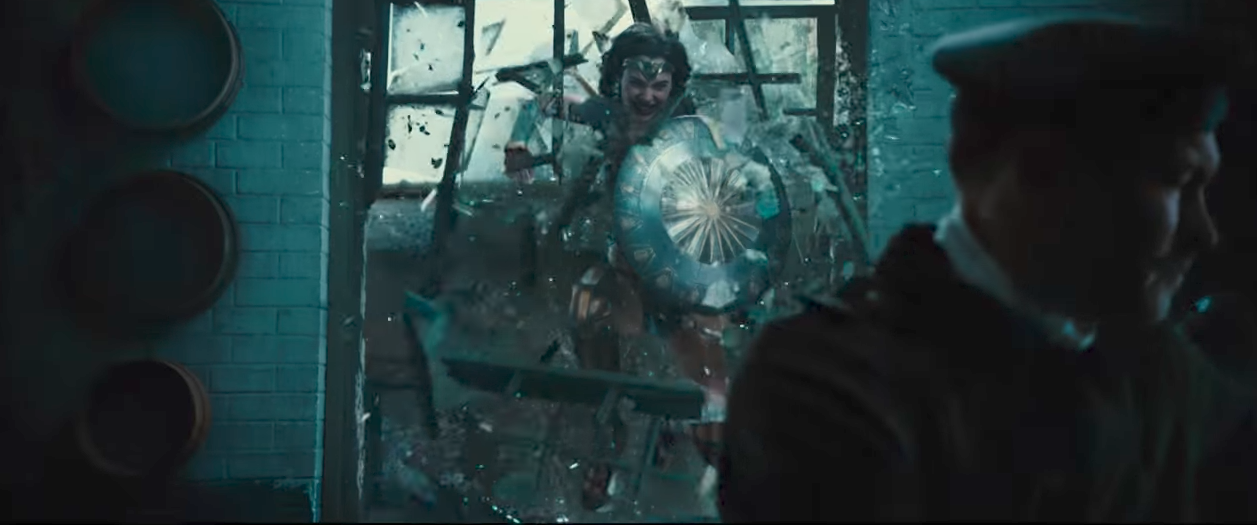My hopes:
- That Wonder Woman is one of those rare comic-book films that capture and hold my attention by questioning whether the glorification of violence is the way to celebrate true courage, conscience, and conviction.
- That Wonder Woman subverts the idea that masculinity is defined by muscularity and “fighting good.”
- That Wonder Woman offers a woman of conscience and wisdom that counter the typical materialistic definitions of female beauty.
My fear:
- That it’s just going to show how a woman can win by playing the same kind of violent one-upsmanship games that men play (and that men erroneously think demonstrate real superiority).
I’ll share my thoughts on Wonder Woman when I’ve seen the film, but until then, here are some worthwhile reviews that dig deeper than assessments of “fun” and “refreshing.” I can’t say they’ve persuaded me that I’ll come away with my money’s worth. But they aren’t discouraging me from seeing it either.
Vic Thiessen (at Vic & Walter Thiessen – On Movies):
Wonder Woman has been hailed as a victory for feminism. Much of the film might be viewed that way. However … showing that a woman can fight as well as any man is not, in my opinion, a victory for feminism and is at odds with all of the other strengths depicted in someone like Diana (intelligence, compassion, courage, etc.).
And how do you reconcile an anti-war message with the use of endless violence to show that war is wrong (killing people who kill people to show that killing people is wrong)? Where is Diana’s reflection on, or even awareness of, the fact that she is trying to achieve her noble ends through horrific evil means? Redemptive violence is an almost inevitable feature of superhero films, so I rarely comment on it anymore, but when it is used in a film that tries to challenge redemptive violence (in this case, war), it must be named. Outside of the Tobey Maguire Spider-man films, superhero films seem to be almost completely unaware of this problem. The fact that Wonder Woman has scenes which display some awareness (e.g. Diana’s confrontation with one of her enemies near the end of he film) only makes the inconsistency harder to understand.
Wonder Woman repeatedly asks the question of whether people are innately evil. Diana refuses to believe it. Good for her. But this theme is explored all too briefly and resolved in a very simplistic manner, highlighting my disappointment with a film that is often hugely entertaining and tries to say good things but is full of confusing mixed messages and has no convincing overarching story, at least from a moral point of view.
Steven Greydanus at Decent Films:
Screenwriter and comic-book writer Allan Heinberg, working from a story co-written with Snyder and Jason Fuchs, invests Princess Diana with possibly the most genuinely heroic characterization of any modern cinematic superhero: a selfless champion of compassion and moral duty who fights for those who cannot fight for themselves.
But he’s not entirely sold on the film. (He gives it a ‘B.’)
If Diana transcends the cynicism and nihilism with which Snyder imbued the first two DC universe movies, the movie is sometimes more cynical than it should be. At times Diana seems so naïve the movie threatens to become an allegory of blind faith, or even lost faith. Other times it seems cynical modernity is on trial. The resolution of these ambitious themes is more thoughtful than I expected, if less than fully satisfying.
Willow Maclay, at Curtsies and Hand Grendades, seems overjoyed by the way the film stands in stark contrast to other superhero movies:
Diana wants nothing more than to grow up like her Aunt Antiope (Robin Wright) & become a warrior, but her mother, Queen Hippolyta (Connie Nielson), is wary of her daughters interest in swords and shields. Hippolyta shows nothing but compassion for her young daughter, and strives to make her learn that being bloodthirsty and craving the battlefield is not a romantic or righteous goal. It was essential in the creation of this movie to tap into Wonder Woman’s true empathy and sincere love for others and in these opening moments on Themyscira a guidebook is created for the character and within her origin her compassion is passed down from mother to daughter and from the creators of the film into the movie itself. This runs in direct contrast to the DC Comics more recent superhero fare which saw Superman break necks and Batman torture prisoners. Wonder Woman is a breath of fresh air and a closer companion to the sincerity of the Christopher Reeve Superman vehicle of the 1970s.
If you want to see just how looking at movies as “culture wars” can rob you of the joy of moviegoing, check out this misguided rant. Sounds like somebody needs an intervention.
[Check back for more reviews. I’ll add ’em as I read ’em.]

Uhh, I wouldn’t get your hopes up any higher. I would say it goes 0.5 for 3.
I enjoyed Wonder Woman a lot; it’s first and foremost a superhero movie with all the baggage that goes with most superhero movies, but there’s a sense of grandeur, world building, and hope which I greatly appreciated, and the action choreography and visuals are pretty top notch. Gal Gadot is great as the title character, and to get into which one of those hopes it half fulfills would be a spoiler.